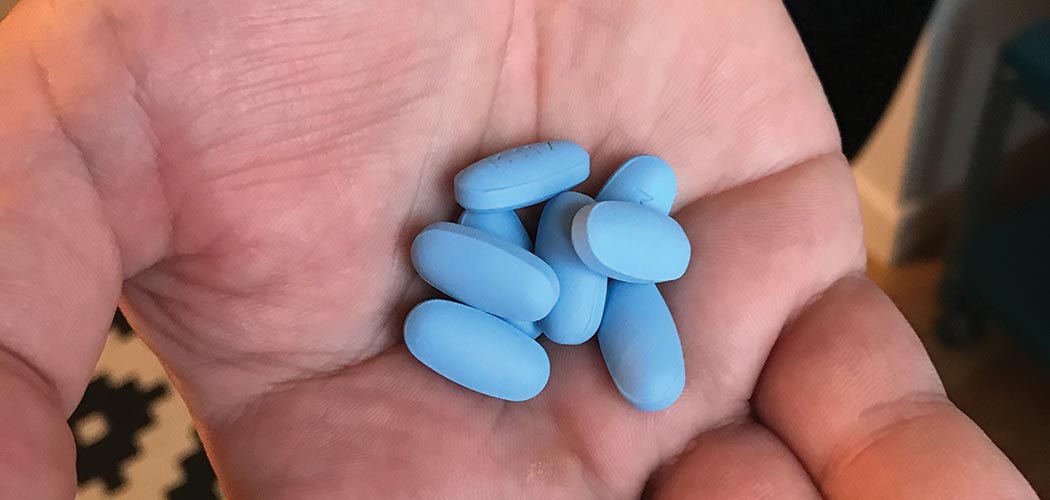How close are we to PrEP being available for all who want it? The current PrEP Impact trial ends in 2020. What happens after that time? David Hudson investigates for Boyz.

HIV transmission rates have fallen in recent years and the UK government has committed to ending transmissions entirely by 2030.
The fall is partly due to people getting tested regularly and quickly placed on effective medication if they’re positive. Once HIV undetectable they cannot pass on the virus. However, it’s also due to many HIV negative people taking PrEP. This medication vastly reduces the chances of acquiring the virus.
Despite this, PrEP is not available to all who want it. To get on to PrEP via the NHS you have to be on the current PrEP Impact trial. This opened to 10,000 applicants in October 2017. In 2018, that expanded to 13,000 when demand exceeded supply. Earlier this year, it was doubled to 26,000 places. Currently, over 16,700 people are taking PrEP through the trial.
However, the trial – launched to test the treatment’s cost-effectiveness and uptake – runs for three years. That means it will end for everyone in late 2020. As yet, there is no guarantee the trial will be replaced by the rollout of PrEP. This is in stark contrast to Scotland, where NHS Scotland now allows PrEP for anyone who wants it.
Could those on the trial face having their supply cut off?
One Londoner, Martin, has been on the trial since it started in 2017. He tells Boyz, “None of the nurses I’ve met with have given me any indication yet of what will happen at the end of the trial. This raises massive concerns as I very much enjoy the freedom and self-assuredness being on PrEP gives me. It puts me back in controls of at least some aspect of my sexual health as opposed to having to rely on the honesty of others.”
One of the organisations campaigning for PrEP access is National AIDS Trust. Its chief executive, Deborah Gold, says the possibility of a gap between the trial ending and PrEP being made available for all is a “completely unacceptable” outcome.
There is good reason for campaigners to be optimistic but also cautious. The decision isn’t just down to NHS England, which has now stated a commitment to fund PrEP pills. Generic versions of the drug are now available, bringing the cost down tremendously.
The complications arise because, in 2012, the government removed ‘public health’ (which includes sexual health) from NHS England’s responsibility and placed it in the hands of local authorities. This means councils now control the services offered at STI clinics. Those services are dictated by how much money local authorities are given by the Department of Health & Social Care (DHSC).
NHS England has pledged to pay for PrEP, but local authorities have to agree to their clinics allocating places and footing the bill for all the follow-up appointments and blood tests that those on PrEP routinely need.
In that sense, the general election has come at a bad time. No decision is now expected until early 2020 on how the DHSC, local authorities, and the NHS England are going to work together on this.
“I am worried that as things stand, the trial has not that long to go now and we don’t have a long-term solution to make sure PrEP will be available and it takes time to set that up,” says Gold. “There is definitely a sense of urgency if we want to avoid a cliff-edge of PrEP access just finishing.”
All the main political parties have voiced support for PrEP, “But we need to see action, not words,” says Gold. “To say you want PrEP to exist isn’t good enough unless you prioritise making the funding available for the whole system to be able to provide it.”
Dr. Will Nutland, of PrEPster, is more outspoken: “[Secretary of State for Health] Matt Hancock and the Tories have had the power, the ability and the authority to move to commission a fully PrEP service for at least the past three years. They’ve chosen not to. Hancock has made noises for the past nine months about PrEP provision and yet we’re still no clearer about future PrEP provision than at the start of this year.”
Even if the government and local authorities agree to offer PrEP services, there’s no guarantee it will be uniform across England. The situation is comparable to local authorities being responsible for drug abuse prevention services, leading to a patchwork of provision across the country.
“PrEP is a game-changer in preventing HIV and we are clear that no one should be turned away from accessing it,” says Debbi Laycock of Terrence Higgins Trust, which has urged the government to make PrEP routinely available by April 2020.
“Prior to the general election, a commitment was made that work was underway to ensure this happens … To get there work needs to be stepped up and accelerated to meet this deadline.”
“I would say we are at a precipice,” says Gold. “Everyone is working to try to make sure that sometime between April and October, everything is in place for PrEP to be available through routine commissioning, but right now, key things haven’t happened that would enable that. The main thing is the Department of Health providing the right level of funding and local authorities committing to accepting the places.”














